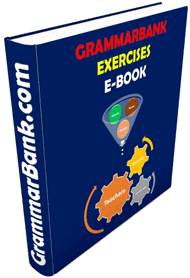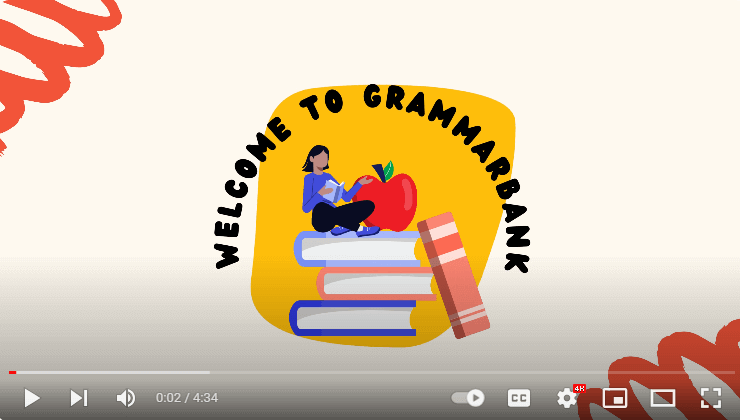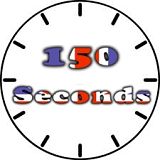Prepositions Charts
Prepositions are words which show the relationship between a noun or a pronoun object and some other words in the sentence. They are always followed by nouns or pronouns. They are called "the biggest little words” in English because they have very important functions.
Also See:
Prepositions Exercises
PDF Worksheets: 1 / 2 / 3 / 4 / 5 / 6 / 7 / 8 / 9 / 10
Also See:
Prepositions Exercises
PDF Worksheets: 1 / 2 / 3 / 4 / 5 / 6 / 7 / 8 / 9 / 10
Three Groups of Prepositions:
a. Prepositions of place, position and direction.b. Prepositions of time.
c. Prepositions for other relationships.
| SOME COMMON PREPOSITIONS | ||||
| PLACE | POSITION | DIRECTION | TIME | OTHER |
| above across along among at away from behind below beside between | beyond by down from in in front of inside into near off | on opposite out (of) outside over around through to towards under up | after before at by for during from in | except as like about with without by for |
Although prepositions are hard to generalize with separate rules, there is one simple rule about them. And, unlike most rules, this rule has no exceptions.
Rule:
They are always followed by a "noun", never followed by a verb.
By "noun" we include:
- Noun (dog, money, love)
- Proper Noun (name) (London, Mary)
- Pronoun (you, him, us)
- Noun Group (my first car)
- Gerund (swimming)
If we want to follow with a verb, we must use the "-ing" form which is really a gerund or verb in noun form.
| Subject + Verb | Preposition | "noun" |
| The pen is | on | the table. |
| He lives | in | England. |
| Henry is looking | for | you. |
| The newspaper is | under | your green book. |
| Pascal is used | to | English people. |
| She isn't used | to | working. |
| We ate | before | coming. |
Prepositions of Time / Place at, in, on
- At for a PRECISE TIME
- In for MONTHS, YEARS, CENTURIES and LONG PERIODS
- On for DAYS and Dates
| At | In | On |
| At 4:30 pm | in March | on Monday |
| At 3 o'clock | In Winter | On 6 March |
| At noon | In the summer | On 22 Dec.2012 |
| At dinnertime | In 1990 | On Christmas Day |
| At bedtime | In the next century | On your birthday |
| At the moment | In the future | On New Year's Eve |
Notice that use of the prepositions of time in and on in these common expressions:
- In the morning /On Monday morning
- In the mornings / On Sunday mornings
- In the afternoon(s) / On Sunday afternoons
- In the evening(s) / On Friday evenings
When we say next, last, this, every we do not use at, in, on.
I went to New York last June (not in last June)
She is coming back next Monday. (not on next Monday)
I go home every Easter . (not at every Easter)
We'll call you this afternoon. (not in this afternoon)
Place: at, in, on
In General:
- At for a POINT (dog, money, love)
- In for an ENCLOSED SPACE
- On for a SURFACE
| At | In | On |
| At the bus stop | In London | On the wall |
| At the corner | In the garden | On the ceiling |
| At the entrance | In a box | On the floor |
| At the crossroads | In a building | On the carpet |
| At the top of the page | In a car | On a page |
Some other common uses of at / on / in
| At | In | On |
| At home | In a car | On a bus |
| At work | In a taxi | On a train |
| At school | In a helicopter | On a plane |
| At university | In an elevator | On a bicycle |
| At the top | In the sky | On the radio |
| At the bottom | In the street | On the left |
| At the side | In a row | On a horse |
| At reception | In a boat | On a boat |
Notice how we can use on a boat or in a boat depending on the type and the size of the particular boat/ship.
Single Word Prepositions
| about | as | despite | of | toward |
| above | at | during | off | under |
| across | before | for | on | underneath |
| after | behind | from | onto | until |
| against | beneath | in | over | up |
| along | beside | into | through | upon |
| among | between | like | to | with |
| around | by | near | together | within |
Single Word Prepositions
| according to | because of | contrary to | except for |
| in addition to | in spite of | on account of | with regard to |
More on Prepositions Use
| Prepositions | use | Example |
| during | while in | during the movie, during the flight, during my stay |
| for | for two days, for an hour | |
| from / to | from Saturday to Monday, from 5 to 9 | |
| between | the time period from one to another | between 1986 and 2012, between Saturday and Monday |
| until/till | before a certain time | until/till Sunday,5 o'clock |
| by | at the least | by Tuesday, by next month, by tomorrow |
| to | movement towards | to school, to work, to the station |
| into | movement towards inside something | into the cinema, into the car |
| out of | to leave a place/a thing | out of the theater, out of the car |
| by | near/next to/beside | LINK stand by me, by the lake |
| through | through the tunnel, through the room | |
| across | opposite ends | across the river, across the street |
| against | against the wall, against the door | |
| into | movement towards inside something | into the cinema, into the car |
| See Our eBooks |
|---|
|
GrammarBank Exercises eBook Instantly Download and Print For Teachers and Students 100% Money Back Guarantee 
|
| ESL Quiz Apps |
|---|






Comments